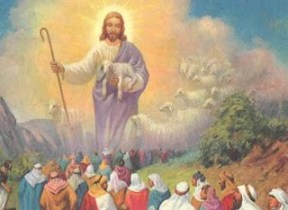The doctrine of the “gathering” is one of the important teachings of the Israelites of old as seen in the Scriptures. God made a covenant with them to bless them and make them prosper if only they obey his commands; unfortunately, they turned away from God and followed their own designs, and this led them into a lot of problems, brought disunity, and banishment from their lands etc. As such, God sent his prophets in order to remind them of his rich promises of unity and hope for a better future. This we see in the prophecy of Ezekiel: “And I will bring them out from the peoples and gather them from the countries, and will bring them into their own land. And I will feed them on the mountains of Israel, by the ravines, and in all the inhabited places of the country.” (Ez.34:13).
Most importantly, in Isaiah, we read: “In that day the Lord will extend his hand yet a second time to recover the remnant that remains of his people, from Assyria, from Egypt, from Pathros, from Cush, from Elam, from Shinar, from Hamath, and from the coastlands of the sea. He will raise a signal for the nations and will assemble the banished of Israel, and gather the dispersed of Judah from the four corners of the earth” (Isaiah 11:11-12). Dear friends, this context equally applies to us for the many times have turned away from God and face the consequences of the hardships, division, pain, sickness etc. that comes with it. Today, the faithful Lord upholds his promise to gather and restore us as we see in the readings of today.
The first reading, taken from the book of the Prophet Isaiah (66:18-21) comes from the very last chapter of Isaiah. Isaiah was the 8th century B.C Jewish Prophet who gave his name to the book. Chapters 1-39 can be referred to as the Book of Judgment which announces the Lord’s judgment of the oppressive nations and of unfaithful Israel; while chapters 40-66 is better understood as the Book of Consolation which reveals how the Lord will redeem his people from exile and oppression. Our reading is at the tail end of the Book of Consolation and it brings the prophet’s picture of redemption to a climactic close. How are we to understand this? The prophecy says: “I know their works and their thoughts, and I come to gather nations of every language; they shall come and see my glory”. When this passage from Isaiah was written, Jerusalem stood as a shell of its former glory; completely levelled by the Babylonians nearly a century before, the people struggled to rebuild God’s Temple and his City. The morale was low and the city remained only half-built. To the citizens of Jerusalem, God must have seemed very distant indeed. The “gathering of the nations” is not only referred to the Israelites, it is also the aim of God’s plan of redemption, to bring all peoples to worship him together (just as the responsorial psalm expresses), and to bless “all the families of the earth” (Gen 12:3). Hence, not only the Jews, but also the Gentiles are brought to Jerusalem to join in the worship of God as at a pilgrim feast.
In consonance to the foregoing, the Gospel reading (Luke 13:22-30) expresses the same thought in a more dynamic way. Jesus says that “people will come from the east and the west and from the north and the south and will recline at table in the kingdom of God.” Here again, we see the in-gathering of the Gentiles pictured. Both Isaiah and Jesus portray the end, the consummation of God’s plan of salvation, in terms of a gathering-in of Gentiles to celebrate and worship God together. Both show salvation side-by-side with judgment. Looking at the verses before the first reading, the judgment of the wicked by fire is described (Isa 66:15-16, 24) and in Luke, Jesus mentions “wailing and grinding of teeth” (Luke 13:28) for the condemned. These two readings hold in tension two contrasting ends, the choice that is always before us: judgment or salvation. We can either be cast out or gathered in. If we hear the preaching of God’s “glory” and follow Jesus, we can look forward to the day we are gathered in to celebrate with the redeemed and enjoy the presence of God forever.
In this vein, the Second Reading from the Letter to the Hebrews continues to exhort us in the light of the proverbial spirit. It is taken from a long discourse in which a father exhorts his son to acquire true wisdom. In the present passage, the father is identified with God and we take the aspect of the sons whom he is addressing. We are encouraged not to disdain the discipline of the Lord or lose heart when reproved by him; for whom the Lord loves, he disciplines; he scourges every son he acknowledges.” We are called to endure our trials as “discipline”. When it appears that we are suffering alone, disunited, inflicted by hardships, the good Lord consoles us today and promises to gather, reunite us, and restore our happiness just as we see in the First Reading. Hence, we are encouraged to take our present difficult situations/trials as “discipline”; God treats us as sons. For what “son” is there whom his father does not discipline? Hence, all discipline seems a cause not for joy but for pain, yet later it brings the peaceful fruit of righteousness to those who are trained by it.
Therefore, when the Lord gathers and restores us, we shall understand that steadfast is his kindness toward us, and His fidelity endures forever, just as the psalmist expresses today (ps. 117:1,2).
Kindly join me in singing this:
“The steadfast love of the Lord never ceases,
His mercies never come to an end;
They are new every morning,
New every morning,
Great is Thy faithfulness, O Lord,
Great is Thy faithfulness.
Shalom!


